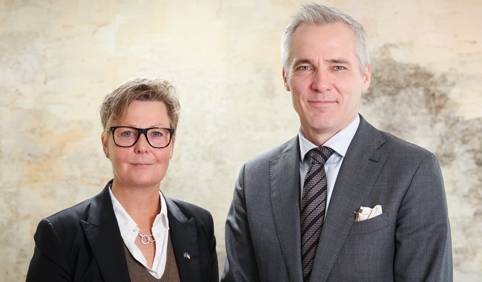FOREWORD BY THE MINISTERS FOR NORDIC CO-OPERATION
During the Finnish and Ålandic co-presidency of the Nordic Council of Ministers in 2025, efforts to deliver Vision 2030 and its three strategic priorities will continue. The political priorities of each administrative area have now been identified in the sectoral co-operation programmes and associated work plans. It’s important that we get well and truly stuck into the efforts needed to reach our 2030 finish line.
The last few years have seen fundamental changes in society and the security situation in our local area. The challenges brought about by climate change and the loss of biodiversity are also especially important. We don’t know when the next pandemic will come. Hybrid impacts are becoming increasingly common.
The Nordic countries stand out in global terms as equal and inclusive societies. Our strong freedom of the press and freedom of expression, in combination with a media-literate population and a strong rule of law, gives us a sound foundation for resisting external influences. The Nordic Council of Ministers encompasses a large number of administrative sectors making it well-suited to working with civil preparedness and overall security. The Finnish and Ålandic co-presidency wants to help ensure that the entire Nordic Region is as well-prepared as it can be for any possible crises.
We will focus our attention on the Nordic Council of Ministers’ priority area “Children and Young People”. Furthermore, we want to see a strong and wide-ranging commitment to this area going forwards.
The planning phase for the renewal of efforts relating to obstacles to freedom of movement is now complete. We must continue these efforts, as individual nations and as a region, to ensure that it’s easy to live, study, work, and do business in another Nordic country.
Regional efforts in neighbouring areas are being continuously intensified. It is pleasing to see that the Baltic countries are also becoming increasingly involved in Nordic co-operation. At the same time, efforts to profile the Nordic Region internationally are continuing, especially through the Nordic embassies’ joint initiatives around the world.
There is now a stronger momentum for Nordic co-operation than there has been in a long time. This is true not only in the traditionally large fields of Nordic co-operation such as culture and education, but also in other areas. A willingness to do more has spread across the board. Nevertheless, it’s important not to take Nordic co-operation for granted. The presidency is seeking co-operation that is more ambitious and robust, that delivers Nordic solutions and new and sought-after knowledge, and that establishes platforms for Nordic co-operation. The Nordic advantage and Nordic added value must benefit us all. Our Nordic Region is strong and united, and accessible to all of us.
In 2025, we’re entering the final decisive phase of the implementation of Vision 2030. The whole of the Nordic Region is working towards the same goals. We can deliver results and promote relevant priorities through focused and effective co-operation.
We wish you all the best for Nordic co-operation in 2025.

Ministers for Nordic Co-operation of Finland, Anders Adlercreutz (right) and Åland, Annika Hambrudd (left). Photo: Katarina Koch